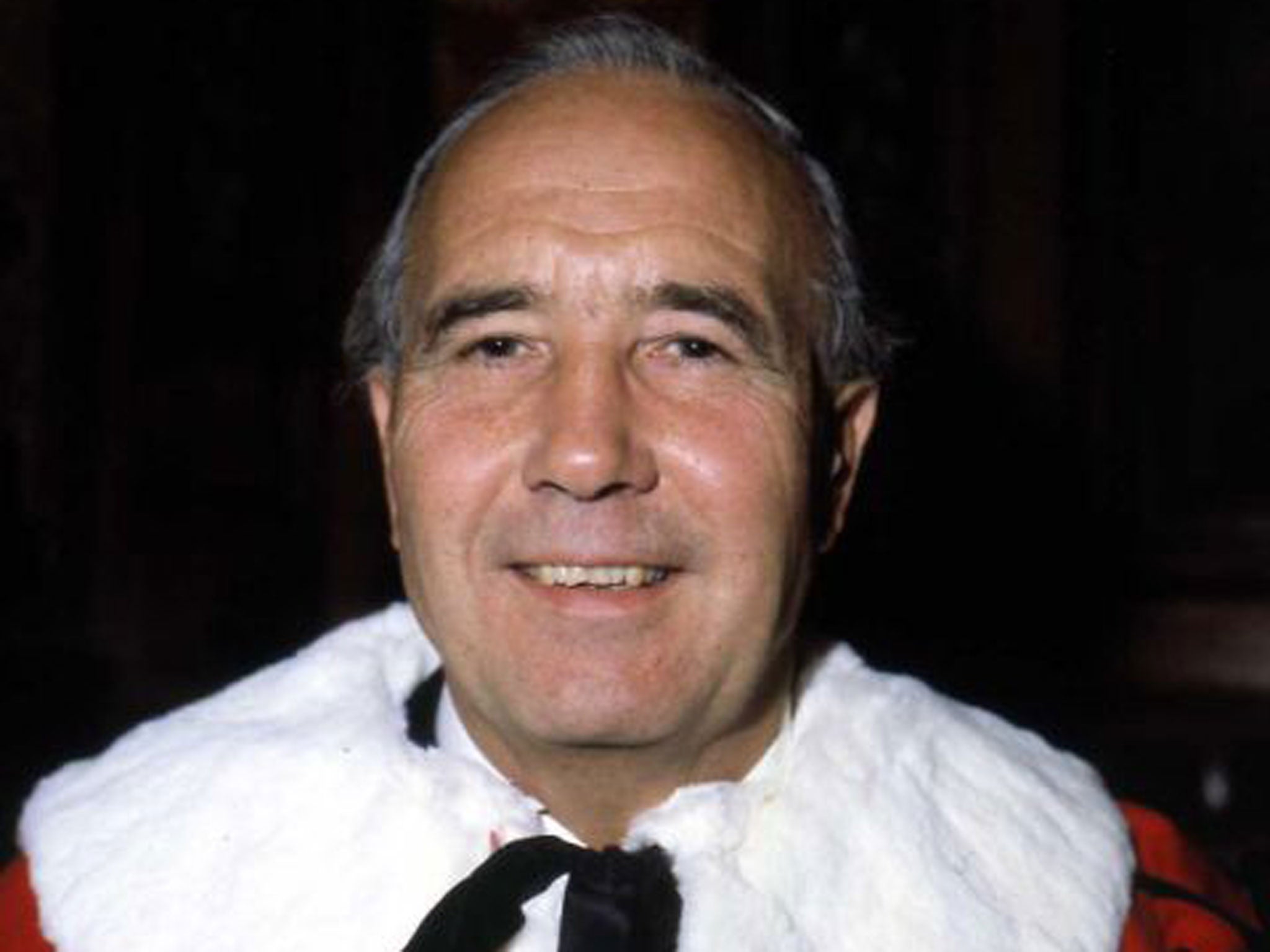Lord Templeman: Law lord who helped fight tax avoidance and ruled against 'Spycatcher'

Sydney Templeman was a law lord who presided over some landmark decisions, ranging from tax avoidance schemes and the prescribing of contraceptives to wayward spies, life-saving surgery and victims of murder claims. Renowned for his quick wit and intellect, Templeman was a succinct and direct orator who used his erudite mind to thrust to the heart of any case, highly intolerant of any counsel who persisted with a line of argument after he had made up his mind.
This earned him the affectionate nickname of "Sid Vicious". During one exchange, when Templeman had been "bashing the lead counsel about a bit", he inquired whether his junior would like to speak. "No my lord," was the reply. "Not without a helmet."
In retirement he continued to voice his opinions on the shortcomings of the legal system, lamenting the encouragement of a culture of litigation by some in the legal profession. He criticised the Law Society for supporting the sale of the names and addresses of accident victims to solicitors to facilitate ambulance-chasing. "What I would call bad luck has gone out of the window," he said. "People now look for someone to blame, anyone but themselves, whereas many accidents are purely bad luck."
Born in March 1920, Sydney William Templeman, the son of a coal merchant, grew up in Heston, Middlesex and attended Southall Grammar School. An avid reader, while he was ill, at 12, he decided upon a career in law, having read a number of Charles Dickens' novels.
He won a scholarship to read History at St John's College, Cambridge, but this was interrupted by the Second World War; he served with the Gurkha Rifles on the North West Frontier, in Imphal, eastern India and in Arakan, western Burma. When hostilities ended he was a major in Burma and had been mentioned in dispatches. Demobbed, he was appointed MBE in 1946 for his work as a staff officer, and returned to Cambridge to read Law.
Called to the Bar by Middle Temple in 1947, Templeman was awarded two scholarships and, specialising in Chancery work, joined chambers in Lincoln's Inn. After a shaky start he began to come to the fore, becoming a member of the Bar Council in 1961 and taking Silk in 1964. He became Attorney General of the Duchy of Lancaster (1970-72) before being appointed a High Court judge, Chancery Division (1972-78). Promotion to the Court of Appeal followed, and he became a Law Lord in 1982.
Templeman pronounced on some key cases and made significant contributions to English law both within and outside his specialist fields of tax law and intellectual property law. He gained notoriety for paving the way for later judges to combat tax avoidance through the concept of "sham Transactions", something he, as a QC in the 1960s, and his practice had been actively involved in aiding clients on tax mitigation schemes or avoidance of estate duty. He later declared, "Every tax avoidance scheme involves a trick and pretence. It is the task of the Revenue to unravel the trick and the duty of the court to ignore the pretence."
In 1985 he was in the news following his support, with one other law lord, for Victoria Gillick's battle to stop doctors from prescribing contraceptives to girls aged under 16 without their parents' consent. "There are many things a girl of 16 needs to practise, but sex is not one of them," Templeman remarked. Gillick, who had five daughters under 16, lost her case.
A couple of years later he gave the lead judgment in the ruling that Coca–Cola was not entitled to a monopoly in its familiarly shaped bottle as a trademark. He was also one of three law lords to support Margaret Thatcher's government, backing the ban on the publication of Spycatcher, the memoirs of the former MI5 officer Peter Wright. He also later supported the House of Lords' decision to continue the ban. However, three years later, in a speech to the High Court Journalists' Association, Templeman admitted that he and his fellow judges had been "too backward-looking to begin with", lamenting that they had "succumbed to political pressure" to reach a quick decision.
In 1988 he gave judgment in the unanimous decision that the mother of Jacqueline Hill, the 13th and final victim of Peter Sutcliffe, could not sue the police, in particular, the Chief Constable, for negligence over Sutcliffe's detection and capture, on the grounds that the police did not owe a duty of care to those attacked and injured by criminals. He retired in 1994.
In his free time he enjoyed family holidays, skiing in Austria until his wife feared it may endanger his career. Thereafter, there were regular golfing holidays in Portugal, with Templeman playing off a 24 handicap.
Despite his fearsome reputation and the confidence he exuded in his own judgement, outside court he was known for his modesty and humour. Once, while golfing in Canada, he was introduced somewhat formally as "Lord Templeman". He presumed the third golfer had already been told his Christian name, but, with each of Templeman's intermittent good shots, the stranger, who had clearly misheard the introduction, said, "Good shot, Lloyd". Templeman remained "Lloyd" for the rest of the round.
MARTIN CHILDS
Sydney Templeman, lawyer; born 3 March 1920; MBE 1946, Kt 1972, cr 1982 Life Peer; married 1946 Margaret Rowles (died 1988; two sons), 1996 Sheila Edworthy (died 2008); died 4 June 2014.
Subscribe to Independent Premium to bookmark this article
Want to bookmark your favourite articles and stories to read or reference later? Start your Independent Premium subscription today.

Join our commenting forum
Join thought-provoking conversations, follow other Independent readers and see their replies